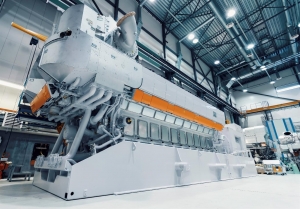


(Posted on 10/12/20)
The technology group Wärtsilä’s highly successful and super-efficient Wärtsilä 31DF dual-fuel engine is being upgraded to increase even further its power output. The higher power output will be available within the same dimensions as previously, thereby delivering greater performance within the same physical footprint. At the same time, the already low level of exhaust gas emissions is being improved to heighten even further the engine’s sustainability factor.The Wärtsilä 31 engine was introduced in 2015 and recognised by Guinness World Records as being the world’s most efficient 4-stroke diesel engine. Furthermore, its economic fuel consumption in turn results in lower levels of exhaust gas emissions. The fuel flexible DF version that is capable of burning natural gas, marine light fuel oil, as well as heavy fuel oil has proven to be increasingly popular for installation on a broad range of vessel types, including among others, cruise ships, ferries, tankers, and fishing vessels.
The power upgrade will result in the current output range of 4.2 to 11 MW, being increased to a range of 4.6 to 12 MW with 600 kW/cylinder at 750 rpm, and 580 kW/cylinder at 720 rpm. The new development also lowers the level of greenhouse gas emissions to a point where a typical ferry can reduce its emissions by as much as 750 tons per annum, corresponding to the average output from 163 cars.
“This power upgrade to the Wärtsilä 31DF represents significant added value to our customers,” says Janne Klemola, General Manager, Product Management Small and Medium bore, Wärtsilä Marine. “Getting more power from an engine that already delivers exceptional efficiency, low emissions, and fuel flexibility is a real benefit. Regardless of whether the engine is installed on ships for propulsion or in land-based power plants for electricity generation, achieving this upgrade with fewer cylinders lowers the lifecycle costs, while at the same time reducing both the installation and maintenance costs.”
Since its introduction, more than 100 Wärtsilä 31 engines have been sold, and in excess of 60,000 field operating hours have been accumulated.
“Sustainable power production is at the heart of Wärtsilä’s product development strategy, and with all sectors of the global economy looking for ways to combat climate change, optimising efficiency and lowering emissions is of critical importance. Internal combustion engines will play a crucial role in balancing the future energy mix, and hence we are focusing strongly on continuously developing our engines to achieve better power generation performance, greater cost-efficiency, and to accept new fuels. Powering up the W31DF is one good example,” adds Jukka Lehtonen, Vice President, Technology & Product Management, Wärtsilä Energy.
Leading vessel performance platform Smart Ship Hub says the industry should expect a breakthrough year... Read more
The Nordic countries are taking an important step towards decarbonising maritime transport with the... Read more
Germany’s Steelpaint has appointed ADD Marine as its representative for Greece and Cyprus, strengthening... Read more
Rio Tinto’s first Pilbara-made iron ore rail car has rolled off the production line in Karratha... Read more
Precision meets progress at Phu My Port, Vietnam. The LPS 550 has been deployed to handle bulk commodities... Read more
bound4blue, a global leader in wind propulsion systems, has expanded its industrial footprint in Asia... Read more
As the industry explores multiple decarbonisation pathways, methanol is gaining attention as a practical... Read more
Technology group Wärtsilä will supply an integrated hybrid propulsion system for a bulk carrier... Read more
Superior Industries, Inc., a US-based manufacturer and global supplier of bulk material processing and... Read more
ESL Shipping has taken a significant step forward in digitalisation by deploying a new multichannel... Read more